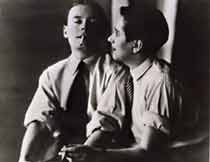
PAKO ELÄMÄÄN
"Elämä on hitaasti hivuttava huume". Ohjaajat Andrea Weiss ja Wieland Speck ovat yhdistäneet faktaa ja fiktiota
sulavasti yhteen kertomaan Thomas Mannin kahden vanhimman lapsen,
Erikan ja Klausin, tarinan elokuvassa Pako elämään (Escape to Life:The
Erika and Klaus Mann Story, 2000).
Ohjaajat Andrea Weiss ja Wieland Speck ovat yhdistäneet faktaa ja fiktiota
sulavasti yhteen kertomaan Thomas Mannin kahden vanhimman lapsen,
Erikan ja Klausin, tarinan elokuvassa Pako elämään (Escape to Life:The
Erika and Klaus Mann Story, 2000).
Sisarukset eivät jääneet Nobel-palkitun isänsä varjoon, vaan jo varhain heidän omat tapansa tehdä ja nähdä asioita yhdessä, lähes telepaattisesti, osoittavat taiteellista persoonallisuutta.
"Klaus oli runoilija alusta alkaen ja sitä Thomas Mann ei tietenkään olisi pojalleen toivonut. Klausille kirjoittaminen oli yhtä olennaista kuin hengittäminen".
Nuoret lähtivät Berliiniin 20-luvun lopussa Klausin ollessa 17-vuotias ja Erikan 18-vuotias. Berliini oli tuolloin maailman kulttuurin keskus, jossa jokainen sielu etsi itseään paitsi ammatillisesti myös seksuaalisesti. Elokuva käy kabareen lavalla ja kurkistaa sen väliverhon taakse, jossa yksi puheenaiheista oli poliitiikka.
Ilmapiirin muututtua Saksassa he jättivät rakkaan isänmaansa ja pakenivat elämään Amerikkaan syksyllä 1936. Mefisto oli Klaus Mannin kolmas maanpaossa kirjoittama kirja. "Jos hän ei olisi ollut Thomas Mannin poika, kaikki olisivat innostuneet hänen kirjoistaan".
Klaus Mann teki itsemurhan 43-vuotiaana ja Erika häädettiin USA:sta McCarthyn vainoissa ja hän palasi Eurooppaan. Erika kuoli Sveitsissä 1969.
Elokuvaa värittävät aidot otteet Erikan esiintymisistä, haastattelut sekä fiktiiviset osuudet, jotka perustuvat Klaus Mannin teksteihin. Vanessa ja Corin Redgrave esiintyvät sisarusparin ääninä.
- Ohjaajat: Andrea Weiss ja Wieland Speck
- Tuotanto: Jezebel Films
In English In English In English
ESCAPE TO LIFE
 Erika and Klaus Mann, the two brilliant eldest children of Thomas Mann, often claimed to be identical twins - ignoring the fact that they were born over a year apart, were of different genders, and didn't look alike. Yet they shared the intimacy of twins which empowered them to live extraordinary creative and intellectually productive lives.
Erika and Klaus Mann, the two brilliant eldest children of Thomas Mann, often claimed to be identical twins - ignoring the fact that they were born over a year apart, were of different genders, and didn't look alike. Yet they shared the intimacy of twins which empowered them to live extraordinary creative and intellectually productive lives.
The film begins with a prologue which sets up their exile, their 'escape to life' from Nazi Germany. This takes place at a turning point in their lives, the beginning of their exile years in America, where cracks begin to appear in their relationship. After the title sequence, the film properly begins with their childhood via a fictional scene, which shows the intense, make-believe world they shared as children. Throughout his life, Klaus returned in his writings to this hermetic, interior world of their childhood as a means of taking refuge from the world.
Born into Germany's leading literary family, Erika and Klaus shared the struggle to assert their individuality and creativity whilst living with the large shadow cast by their famous, Nobel Prize-winning father. Like all children, Erika and Klaus craved the love and respect of their father, so remote and all-powerful that throughout their lives they referred to him as 'The Magician'. They were able to survive, even thrive, without it because they had the unconditional love and support of one another.
Erika and Klaus Mann were writers, actors, homosexuals and pacifists. In a time of great moral and political uncertainty, their moral and political convictions were clear and unwavering - while their lives were riddled with contradictions. Klaus was a writer who saw his work banned from being published during his lifetime. Erika was an actress who faced actual laws passed against her performing in Europe. Erika was a lesbian who married twice: once to the actor Gustaf Gründgens, and once to the poet W.H. Auden, through whom she was granted British citizenship. Klaus was a pacifist who joined American Army to fight against his former homeland.
Their relationship was strained by these pressures and by the demands of living in permanent exile. It was then shattered by Klaus's drug addiction and by Erika's gradual shift in loyalty from her brother to their father, which Klaus interpreted as the ultimate betrayal. The film ends with Klaus's suicide and Erika's eviction from the United States, where she had finally made a home for herself after so many years of continuous travelling.
- Director: Andrea Weiss amd Wieland Speck
- Production: Jezebel Films

Päivitys:10.6.2001 U.E.